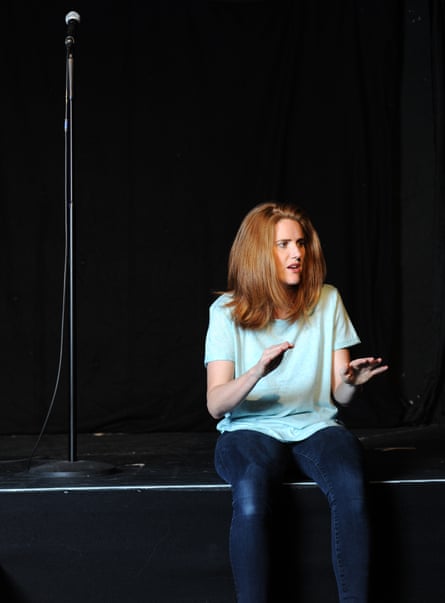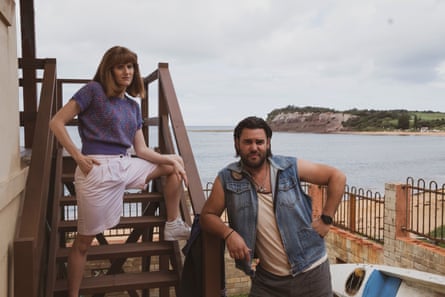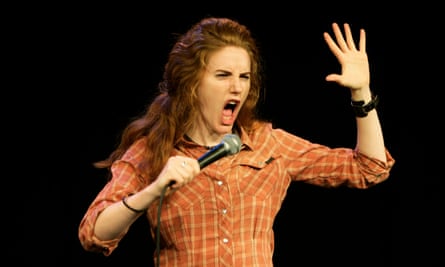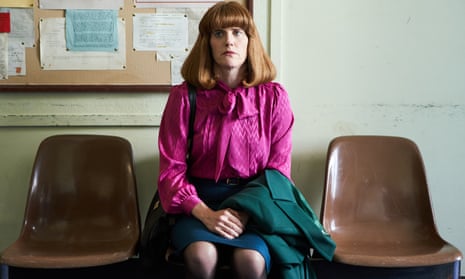Imagine being so uncomfortable in your job, it makes you vomit. And doing that job in such a toxic environment that, for 10 years, the “overwhelming feeling … was just constant fear”. Then returning to work after having kids, and feeling no connection to it whatsoever.
Now imagine, just a few years later, being the writer and star of your own hit TV comedy-drama, reaping the rewards of those two fretful decades toughing it out in standup comedy. Sarah Kendall doesn’t have to imagine. “I got lucky,” she says. “If you’d told me when I was starting standup that I’d get here, I would have been so happy. Genuinely,” she says, “I just cannot believe my good fortune.”
Fortune has little to do with it. Kendall is the creator of Frayed, the tragi-farcical tale of a wealthy London socialite left unexpectedly penniless – and homeless – when her husband dies. Its first series depicted Sammy and her two pampered kids’ relocation to her unglamorous Australian home town, where our anti-heroine faces a reckoning with the dysfunctional life she left behind. Its second is now on Sky Max, which feels like a minor miracle to Kendall, 45, who wrote it while locked-down under Covid conditions with her young family. “I had two kids in my lounge-room all day while I was trying to write,” she says, via Zoom from that same south-west London home. “I was between three computers in the house, always trying to put out spot-fires. The whole thing was a blur.”

Clearly, her talent is proof against infant incursion: three episodes in, Frayed 2.0 is proving just as rich as its predecessor. (Its ensemble includes Philomena Cunk star Diane Morgan and Aussie acting royalty Kerry Armstrong.) The show draws on a series of twisty storytelling comedy shows Kendall made, and adapted for radio, between 2015 and 2018. (The first and best, A Day in October, was nominated for the Edinburgh Comedy award.) They fictionalised experiences from Kendall’s youth in the New South Wales “shithole” (her word) of Newcastle. “A hell of a lot” of that material has been absorbed into Frayed, Kendall says, while fudging how autobiographical the series actually is.
“My therapist has a lot of opinions about that,” she says, coyly – but you can see why Kendall might hesitate to identify with her Frayed alter ego. Stern of fringe (the show is set in the 1980s), a pathological liar and shamelessly covering up the manslaughter that concluded series one, Sammy is no one’s idea of a flattering self-portrait. “All my favourite comedy archetypes are incredibly pompous,” Kendall explains. “I don’t know what that says about me – but I like high-status people who fall down.”
“So is it autobiographical?” Kendall reconsiders. “Yes and no. Sammy’s father is an RAF pilot, whereas my grandfather was an RAF pilot. And my mum isn’t an alcoholic, but my grandfather was. So I’m mixing all that in. But obviously, I’ve never killed a guy.” What about the very stark schism the series depicts between Sammy’s British and Australian lives? I wonder aloud whether making the show – largely filmed in Australia, co-produced by ABC TV – has helped reunite the world-apart halves of Kendall’s own identity. But she cuts me off before the question ends. “No,” she says. “Not at all.”

Kendall arrived in Britain more than two decades ago. It was at university in Australia that she first tried her hand at standup – after a few false starts. “I put my name down twice, and both times I cancelled because I was so violently ill. I was exploding from both ends with nervousness. It was the most incredible physical aversion.” She persevered only because she wanted to prove herself funnier than the male comics who dominated the bill. Soon enough, she was a gigging comic, thrilled by the lifestyle, and the camaraderie. “I just felt like ‘these are my people’. It wasn’t immediately a professional recognition, it was more of a social recognition. There was a tribal aspect.”
“I wasn’t enjoying uni, I had a shit job in a pub. But I could get on stage and talk into a mic, and it would make my life feel vibrant and interesting. Then when you told people, they’d go ‘OH MY GOD, I could never do that!” They’d treat you like a superhero.” It wasn’t that the discomfort ever went away. “Every time I’d get on stage, I’d feel so sick.” But Kendall had found somewhere she belonged. “To this day,” she says, “I still love sitting backstage with a bunch of comics and talking shit. If my ashes were going to be interred anywhere, it would be backstage at a comedy venue.”
And yet – there’s a flipside to these happy memories, and more context to the queasiness Kendall felt about standup life. “It wasn’t other comedians’ fault,” she says, “but there was an atmosphere, and it was hostile. Hostile to women, to anything that was other – other than male, really, and even better if you were a white male. And that environment just made you go ‘how am I going to recalibrate me to exist in this environment?’ It didn’t feel like I could just be who I was.”
“My top emotion throughout that period was that I just had to be better. I needed to work harder and try harder. I didn’t want to suck at a gig and come off stage and go ‘I just went badly because they don’t like women’. My opinion was: I need to be better. But underneath that – and I wasn’t cognisant of this at the time – I was driven by fear.” Looking back, Kendall can see that “the whole environment rewarded all the things we regard as the worst aspects of maleness. It put a crown on that kind of shit.”
It was only when Kendall came back to performing, after taking a break to have children (with her husband, comedy writer Henry Naylor), that she realised, “my standup felt like it belonged to another person. I didn’t feel any connection to it.” In response to that, but also as a pragmatic measure – given that the five-nights-a-week lifestyle didn’t feel viable to this young mum – Kendall pivoted towards solo storytelling. “And I found that I loved it, so much more than I’d ever loved standup. It felt more confident, more of a declaration of who I was and what I did.”

“When Frayed got commissioned,” she says, “I was 42, and starting to think ‘this is not going to happen for me.’ A few more years, and I probably would have quit. Then the whole narrative around women and comedy shifted. The industry changed completely within 30 seconds. Companies were suddenly going: we actively want to hear women’s stories. And those stories did well commercially. And I was a real beneficiary of that.”
The change extends to the standup world Kendall thought she’d left behind. “I love going to standup venues now. The presence of people who are queer, people of colour. It just used to be all white men with a woman chucked in.” Might that yet lure Kendall back on stage? She doesn’t rule it out, and stresses that – were she to perform live again – she’d want to do standup, not the storytelling with which she once supplanted it. “But the pact I’d have to make with myself would be: you do know that’s five nights a week? If you’re going to do it, you’ve got to do it properly.”
In the meantime, there’s Frayed – the prospects for which, says Kendall, “I’ll know more about in two or three weeks”, when its second series’ success is established. Were it not recommissioned, “I’ve got another idea for a show that I can’t stop thinking about. And it’s a real gear-change for me. The next thing I do, I want it to be completely different. I want to keep searching out that feeling of ‘I don’t know what I’m doing here’.” In any event, quitting now is not an option. “You do think about how many people – women, queer people, people of colour – got forgotten and left behind, how many voices have been lost,” says Kendall, relieved not to be one of them. “I got lucky. And I don’t take it in any way for granted.”
